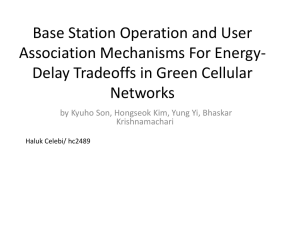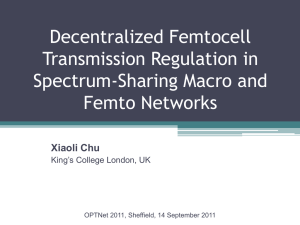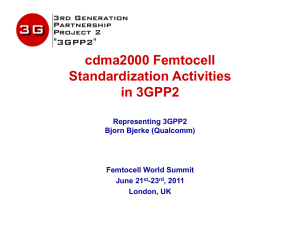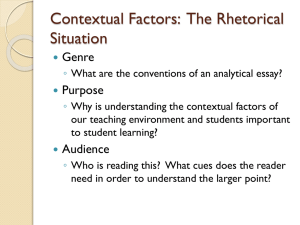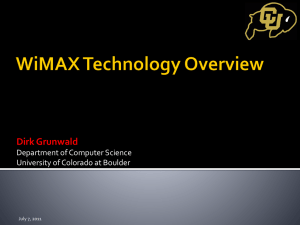Spectrum Allocation inside Femto based on CQI and Geographical
advertisement
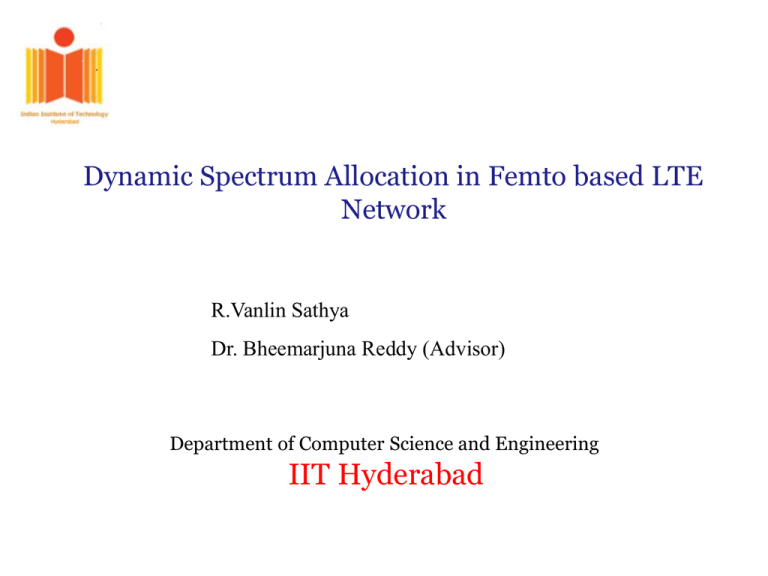
Dynamic Spectrum Allocation in Femto based LTE Network R.Vanlin Sathya Dr. Bheemarjuna Reddy (Advisor) Department of Computer Science and Engineering IIT Hyderabad Motivation In future video traffic will contribute to 70% of the total traffic. 20% of traffic will be because of mobile data. Source: Huawei Technologies, HiSilicon Motivation 60 % of the traffic will be indoor Drawbacks:: Lack in indoor Coverage Decrease in data rate. Source: Huawei Technologies, HiSilicon Heterogeneous Network Small Cells: 1. Femto Cells 2. Pico Cells 3. Relay Source: Wireless Networking and Communication Group, Prof Robert Why not Wi-Fi? Wi-Fi LANs does not provide a good quality for voice communication because of CSMA MAC. Femto APs can coordinate their communication in co-operative manner with other femtos whereas Wi-Fi APs have to compete with other radios operating in un-licensed band. Wi-Fi APs work in un-licensed band where as femto works in licensed band So, less interference for Femtos. Femto Characteristics The range of Femto (HeNB) is 30 m for residential and 300 m for enterprise. A home Femto can serve up to 7 users whereas enterprise Femto can serve up to 50 users. Femto Base Station (AP) can self-optimize and manage its operation. Femto can offload traffic from Macro BS (eNB). In wi-fi vertical seamless handover is a tough problem to tackle when compared to horizontal handover that happens in macro to femto. LTE with HeNB eNB Macro BS HeNB Femto BS HeNB GW will carry the signaling information. Till Release 10, there wasn’t any X2 interface between HeNB. HeNB GW is used to reduce the load of MME (Mobility Management Entity) Source: 3gpp TS 36.300 Open Problems Interference Management: 1.Cross-tier interference between the macro cell and femto cell tiers. Downlink: Scenario 1: HeNB sends the downlink traffic to M-MS Scenario 2: eNB sends the downlink traffic to F-MS Uplink: Scenario 1: M-MS sends the uplink traffic to HeNB Scenario 2: F-MS sends the uplink traffic to eNB Source: Interference Coordination for Femtocells,Docomo Euro-Labs. Open Problems 2.Co-tier interference within femto cell Layer. HeNBs ---> A,B,C Source: Interference Coordination for Femtocells,Docomo Euro-Labs. Efficiency in Scheduling Related Work Fractional Frequency Reuse (FFR): The Frequency Reuse pattern used in FFR is reuse three. The Whole Spectrum band is divided in to W0,W1,W2,W3 Only a part of the spectrum is used in each Femto cell. The reason for providing only some part of the spectrum is to avoid the interference between the neighboring cells (outer region). Drawback in FFR: The Spectrum band is not used efficiently in each Femto cell. Source: InterferenceManagement in co-channel Femtocell Deployment, Feb 2012 Soft Frequency Reuse (SFR): The frequency reuse pattern used in SFR is Reuse one. The whole spectrum (w0,w1,w2) can be used in each Femto cell. The interference between neighboring cells is reduced. Drawback in SFR: Spectrum is statically distributed in each femto cell Load distribution within femto cell is not taken into account during allocation of spectrum to different regions Spectrum Efficiency Overhead No of users FFR SFR Less High Less signaling Low Less signaling Medium Source: InterferenceManagement in co-channel Femtocell Deployment, Feb 2012 SFR Proposed Idea To improve the efficiency of spectrum, we propose Dynamic Resource Allocation (DRA) scheme. Dynamic Resource Allocation between Macro and Femto region Dynamic Resource Allocation inside Femto (HeNB) region 1. Dynamic ResourceAllocation between Macro and Femto In case if more number of Femtos are deployed, the dynamic resource allocation between Macro and Femto is taken care by femto gateway to ensure scalability. The reallocation of bandwidth between macro and femto won’t happen frequently. Depending upon the overall traffic load, the bandwidth will be allocated dynamically between macro and femto regions. This (planned placement of femtos) is applicable only for enterprise buildings. 1. Dynamic Resource Allocation between Macro and Femto Example: Total Bandwidth = 20 Mhz Macro Bandwidth = 15 Mhz Femto Bandwidth = 5 Mhz 1Mhz Bandwidth = 6 RB(Resource Block roughly), so Femto has 30 RB. Minimum one RB should be allocated to the requested user. Assume, the number of users in Femto is 10 So, minimum 2Mhz Bandwidth (i.e 12 RB) is sufficient. Roughly 18 RB are unused. Now Femto BS has to shift 2Mhz bandwidth dynamically to Macro BS, so now Macro BS has 17Mhz. Dynamic Resource Allocation: The Base Station should not be rebooted, but the station should be aware of free available resource block in its coverage area. Mobile device need not re-associate and re-lock to the preamble. The bandwidth available for femto BS can be divided into multiple separated sub-carriers. 2. Dynamic ResourceAllocation inside Femto (HeNB) HeNB 2 HeNB 1 eNB HeNB 3 Spectrum Allocation inside Femto based on CQI and Geographical position (GP) The division of spectrum region inside HeNB is based on Channel Quality information(CQI) / GP from the indoor users. The CQI/GP value of the static indoor users will be constant. The number of users in the indoor is calculated by the scheduler of base station and it depends upon the CQI/GP value range. Depending upon the number of users in the region, the resource block is allocated dynamically. Spectrum Allocation inside Femto In our work, we consider deploying Femtos in enterprise buildings and they are done in hexagonal grid manner. The reason for spectrum division in HeNB is to avoid the interference between the neighboring cells. 2. Dynamic ResourceAllocation inside Femto (HeNB) HeNB 2 HeNB 1 eNB HeNB 3 FFR SFR DRA Spectrum efficiency Less High Very High Overhead Less signaling Less signaling No of users Low Medium Less Signaling High Future Plans Implementing DRA scheme and comparing the DRA results with existing FFR, SFR in terms of throughput, spectrum efficiency, numbers of users it can handle. Formulating it as an optimization problem. References [1] Karthikeyan Sundaresan “A Femtocell Resource Management System for Interference Mitigation in OFDMA Networks” NEC Labs,MobiCom 2011. [2] Poongup Lee, Jitae Shin “Interference Management in LTE Femtocell Systems Using Fractional Frequency Reuse, ICACT 2010. [3] Karthikeyan Sundaresan “Experimental Characterization of Interference In OFDMA Femtocell Networks” NEC Labs, ICOC 2012. [4] Christos Bouras “Interference Management in LTE Femtocell Systems Using an Adaptive Frequency Reuse Scheme” IEEE 2012. [5] Parag Kulkarni,Tim Farnham “Radio Resource Management Consideration for LTE Femto cells”, ACM SIGCOMM Computer Communication, January 2010. LTE University2(http://lteuniversity.com/)12 Small Cell Forum (http://smallcellforum.org/smallcellforum/)h
